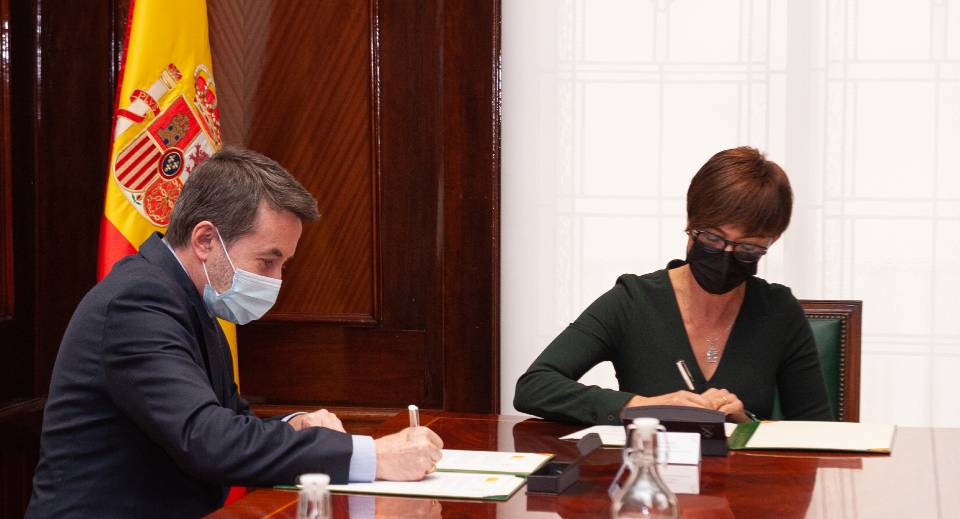Repsol and the Guardia Civil sign a collaboration protocol to promote more sustainable mobility
- This collaboration is aligned with the Sustainable Development Goals (SDG) that the United Nations is promoting through its 2030 Agenda.
- The protocol covers aspects such as the improvement of sustainable mobility, energy efficiency and sufficiency, as well as environmental awareness and the launching of joint R&D&I initiatives.
- Both institutions, private and public, also intend to explore and launch different initiatives in the framework of this collaboration protocol to provide social assistance and professional training to the employees of both.
Repsol CEO Josu Jon Imaz and the Director General of the Spanish Guardia Civil police force, María Gámez, today signed a collaboration protocol to improve the sustainability of mobility, among other goals. The agreement between the multi-energy company and the law enforcement agency aims to promote environmental sustainability through self-consumption and the promotion of a safety and environmentally aware culture. Both institutions share many interests in these areas, in which the Guardia Civil is working to advance through its SEPRONA operative branch, the best exponent of the high standards it sets itself in environmental matters.
This protocol considers the option of initiating programs with installation of electric recharging points and self-consumption by means of photovoltaic solar energy. At the same time, the parties will be able to ex-change experiences with products and services as well as carrying out joint R&D&I initiatives to improve safety through the sharing of equipment, infrastructure, and work resources.
The collaboration is part of the strategic lines of the 2030 Agenda that the law enforcement agency has set out in governmental and ministerial plans. Through this alliance, both organizations undertake, individually and jointly, to share synergies that favor the development of sustainability initiatives to the benefit of both organizations.
This agreement will lead to the immediate implementation of joint work programs that will include environmental and ethical matters in business practice and in the provision of services to the public, such as respect for human rights and social dialogue that enables learning about and addressing citizens' concerns.
The agreed protocol also includes elements of improvement and support for the members of both organizations, through the promotion of a culture based on safety and social action.
The Guardia Civil is in the process of approving its second Sustainability Plan (2021-2025), the orientation of which is fully aligned with Repsol's recently approved Strategic Plan 2021-2025. Both plans lay out roadmaps to integrate sustainability in their respective fields of action.
The collaboration protocol also aims to encourage some of the Sustainable Development Goals (SDG) that the United Nations has been promoting since 2015:
- ODS7: Affordable and clean energy
- ODS9: Industry, innovation, and infrastructure
- ODS11: Sustainable cities and communities
- ODS13: Climate action
In this regard, Repsol has for years been immersed in a process of transformation and diversification of its businesses with the aim of leading the energy transition. It was the first company in its sector to support the Kyoto Protocol, the first to issue a green bond, and also, in December 2019, the first to set the goal of becoming a company with zero net emissions by 2050.
Additionally, Repsol is the main multi-energy supplier in Spain, providing solutions that improve efficiency, increasing the weight of low-emission energies, and developing digital products and tools.
The Guardia Civil has more than 2,300 infrastructures for its energy-consuming resources (vehicles, vessels, aircraft). Therefore, within the new framework of institutional strategies to address the impact of their use, the Guardia Civil aims to play an essential role in promoting new developments soon to be made possible and profitable in their fields of action through technology. The institution also makes a cutting-edge contribution internationally through its participation in missions and programs of the external action of the Spanish State.
